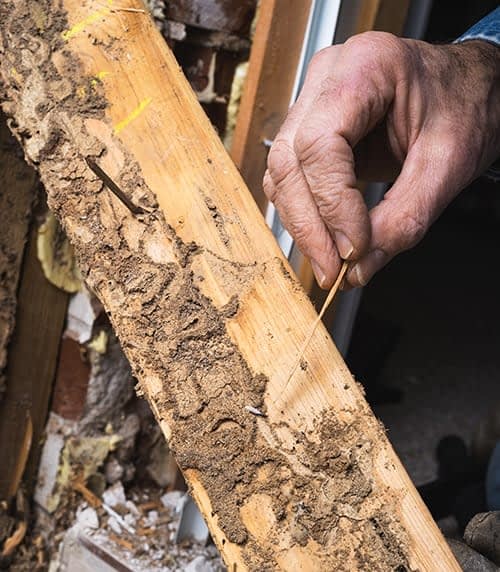Emergency Termite Removal: What NJ Homeowners Need to Know
Emergency Termite Removal: What NJ Homeowners Need to Know By Horizon Pest Control As late summer transitions into fall, termites continue their destructive work—quietly consuming
 Termites can cause significant damage to your home and other buildings on your property. Wood is the mainstay of the termite diet, but they can traverse through a variety of materials other than wood and cause serious structural damage, even rendering it unlivable.
Termites can cause significant damage to your home and other buildings on your property. Wood is the mainstay of the termite diet, but they can traverse through a variety of materials other than wood and cause serious structural damage, even rendering it unlivable.
Subterranean termites build their colonies in the ground and create tunnels to their food source – your home. These colonies can be massive, hosting tens of thousands of termites. Formosan termites have even larger colonies with populations numbering in the millions. This means that the colonies cover a very large area – and not only on your property. They can extend over several lots in a subdivision. So if your neighbor has termites it would be wise to look for damage or signs of a termite infestation in your own home.
Unfortunately, termite damage often goes undetected until serious damage has already been done. The signs can be very subtle and easy to miss. If you see what appears to be water damage on your ceiling, wall, framing, or flooring, take a closer look. Termite damage can mimic water damage.
Other Signs to Look for Include:
Subterranean termites access their food sources that are above the ground via mud tunnels. These tunnels are created by the termites using mud, saliva, and feces. You can often find them near the foundation of a home that is infested but they may also be around door frames and window sills as well as cracks and joints.
If You Suspect, Inspect.
If you suspect that you have termites, conduct a thorough inspection of your home. Usually, subterranean termites are found near ground level of a home. This is not always the case, so don’t take it for granted that you are free and clear just because your first floor doesn’t show any signs.
Inspect the interior as well as the exterior, using a knife or screwdriver. Look for weak spots in the wood and hollow sounds when you tap on it. Using a bright flashlight, look in your crawlspace or basement for mud tunnels or swarmers. Since termites must live in a moist environment and cannot live long when not in the ground or a moist area, you may see swarmers around pipes in the bathroom or kitchen as well.
If you note termite damage or any indication of an infestation (this includes if your neighbor has termites) your best bet is to contact your pest professional and get a termite inspection on your home. If termites are found they can advise you on the best course of action. If you don’t have termites they can provide you with termite protection so in the event the little invaders decide to turn your home into lunch you can ensure that your home is secure.
Don’t let termites destroy your property! Call Horizon Pest Control for effective and affordable termite control in New Jersey.
Emergency Termite Removal: What NJ Homeowners Need to Know By Horizon Pest Control As late summer transitions into fall, termites continue their destructive work—quietly consuming
How to Not Bring Pests Home With You While Traveling By Horizon Pest Control When you embark on a vacation or a business trip, your
Flying Termite Infestations: Understanding the Threat to Your New Jersey Property By Horizon Pest Control While they do not have the ick factor of pests
